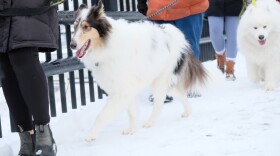Governor Chris Sununu is backing stricter commercial breeding regulations. The move follows the rescue of 84 Great Danes from a suspected puppy mill in Wolfeboro earlier this year.
Under current state law, anyone who sells more than ten litters of puppies each year, or 50 individual dogs, must register as a commercial breeder. Animal rights activists say that threshold is too high, pointing to Vermont, which requires a license for the sale of just three litters.
Gov. Sununu says tightening the rules would ensure greater safety.
“Because whether it is dogs or cats or bears, we do have a responsibility,” said Sununu during a ceremony in Wolfeboro. “It is part of who we are in the state of New Hampshire, it is part of our culture.”
While in Wolfeboro, the Governor signed an Executive Order to revamp and strengthen the Governor’s Commission on the Humane Treatment of Animals. (He also announced his plans to adopt a kitten for his family later this month.)
During the 2018 legislative session, Sununu plans to work with the Humane Society of the United States, as well as Republican State Senator Jeb Bradley, to craft new commercial breeder legislation to ensure facilities are inspected and upholding proper animal care standards.

“The rescue of 84 Great Danes from a suspected puppy mill in Wolfeboro highlights the gaps in New Hampshire’s animal cruelty laws and we’re thrilled that Gov. Sununu supports commonsense reforms to prevent such cruelties from happening again,” says Lindsay Hamrick, state director for the Humane Society.
Sununu is also backing legislation that would allow a judge to rule on who pays for the costs associated with caring for animals seized during a criminal investigation. Currently, those costs often fall on municipalities, not the owners of the animals.
In Wolfeboro, the Humane Society estimates that the price tag for rehabilitating the 84 Great Danes, some of which required eye surgeries and other care, could reach $500,000. The Humane Society is covering all of those costs.
In June, 75 Great Danes were removed from a 13,000 square foot mansion owned by Elizabeth Fay, after Wolfeboro Police received reports of cruelty and neglect. Another nine Great Danes owned by Fay were seized from a home in Bartlett. The animals were found living in squalid conditions, a striking juxtaposition to the grandeur of the house, which is set on 53 acres and last sold in 2015 for more than $1.5 million.
Ms. Fay was charged with two counts of animal cruelty, though officials say they plan to file more charges. The animals are being held as evidence.
Last week, an attorney for Ms. Fay told the Concord Monitor that his client objects to the Humane Society performing surgeries on the dogs without her consent. Attorney Kent Barker says the public has rushed to condemn Ms. Fay.
“There’s been so much venom directed at her that has not been supported by real facts,” Barker told the Monitor. “Is the whole story out there? Absolutely not.”








